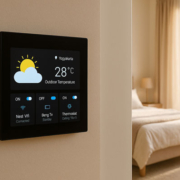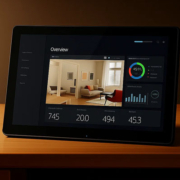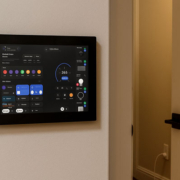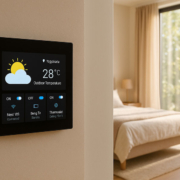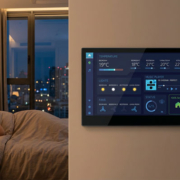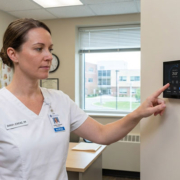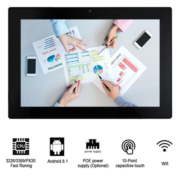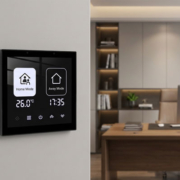The Role of Customized Control Panels in Smart Factory Integration
The rise of smart factories—powered by automation, IoT (Internet of Things), and advanced analytics—has significantly transformed manufacturing processes. As factories become more connected, efficient, and data-driven, customized control panels play a pivotal role in integrating diverse systems, optimizing operations, and enabling real-time decision-making. These smart control panels serve as centralized hubs for monitoring, controlling, and automating various factory systems. In this article, we explore the key role of customized control panels in the integration of smart factories and how they contribute to greater productivity, efficiency, and safety.
1. Centralized Control and Monitoring
One of the primary roles of customized control panels in smart factories is to provide a centralized interface for monitoring and managing a wide range of systems and devices. In a smart factory, there are multiple systems working together, including production lines, automated equipment, robotics, HVAC systems, lighting, and security systems.
Customized control panels, such as those offered by Portworld, allow factory operators to view and control these systems from a single interface. This centralized control ensures that operators can make quick adjustments, address issues promptly, and optimize workflows without having to switch between different systems or devices. For example, a Portworld smart control panel can integrate production data, machine status, energy consumption, and environmental controls, enabling operators to keep track of all operations in real-time.
2. Real-Time Data Monitoring and Analysis
In a smart factory, real-time data monitoring is essential for improving efficiency, reducing downtime, and ensuring optimal performance. Customized control panels act as a gateway for accessing data from various sensors and machines throughout the factory floor. By displaying real-time data in a clear, actionable format, these control panels help operators make informed decisions quickly.
For example, a customized control panel from Portworld, such as the YC-1011, can collect and display data from equipment such as conveyor belts, robotic arms, and CNC machines. This allows factory operators to monitor machine health, detect anomalies, and predict maintenance needs before they result in costly downtime. By integrating predictive maintenance features, these panels can alert operators to potential issues, reducing the risk of unexpected breakdowns and enhancing overall equipment efficiency (OEE).
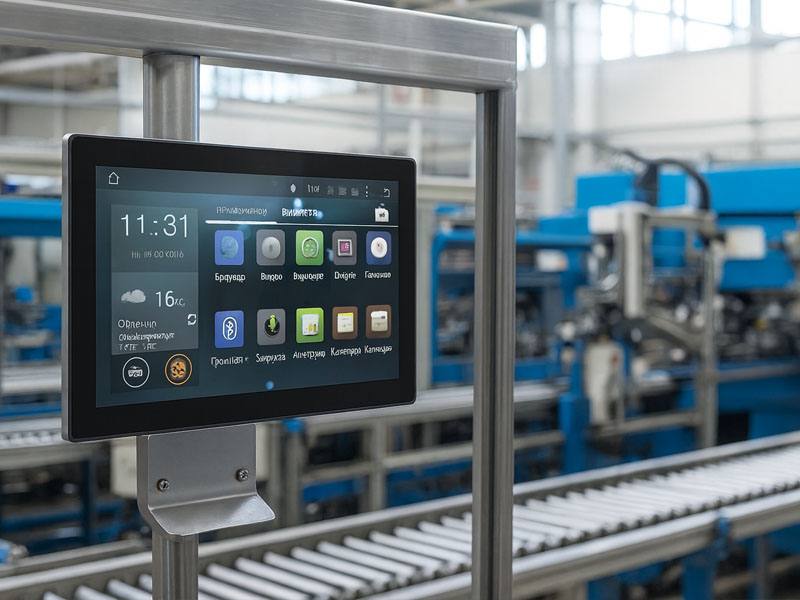
smart control panel
3. Optimizing Production and Automation
Smart factories rely heavily on automation to increase production speed, consistency, and quality. Customized control panels are essential in streamlining automation by providing a user-friendly interface to control automated machines and robotics.
Portworld’s customized control panels, such as the YC-SM41P-KNX, can integrate PLC systems, robots, AGVs (Automated Guided Vehicles), and other automated devices to create an intelligent manufacturing environment. Operators can use these panels to control automated workflows, adjust settings, and even monitor the performance of robots and machines in real-time. By automating routine tasks and providing operators with complete control over the automation process, customized control panels enhance production efficiency and reduce the risk of human error.
Moreover, the ability to schedule tasks and program automation sequences through the control panel enables more precise production planning and execution. For instance, the panel can trigger automated adjustments in machine settings based on production demands or inventory levels, ensuring that the factory operates at maximum efficiency.
4. Energy Management and Sustainability
Energy management is a critical concern for modern smart factories. With the rising costs of energy and increasing pressure to reduce environmental impact, energy efficiency is a priority for many manufacturers. Customized control panels are key tools in integrating energy management systems (EMS) into factory operations.
Customized control panels from Portworld, such as the YC-1011 and other smart touch panels, allow manufacturers to monitor and control energy usage in real-time. These panels can be connected to energy meters, HVAC systems, and other energy-consuming devices to track consumption and identify areas where energy savings can be made.
For instance, a control panel can display real-time energy consumption data, highlight areas of excessive energy use, and suggest automated adjustments to optimize energy efficiency. These panels can also be integrated with smart lighting systems, temperature controls, and machine idle time to ensure that energy is used only when necessary, contributing to both cost savings and sustainability goals.
5. Improving Worker Safety and Security
Worker safety is a top priority in any manufacturing environment, and smart factories are no exception. Customized control panels contribute to worker safety by integrating with safety systems, such as emergency stop buttons, hazard detection sensors, and security cameras.
For example, customized control panels can display alerts for safety hazards, such as an overheating machine or a robot operating in a restricted area. These panels can also trigger safety protocols automatically, such as shutting down machinery in the event of an emergency. By centralizing safety monitoring in a single interface, operators can respond quickly to any safety issue, preventing accidents and ensuring compliance with safety regulations.
In addition, security systems integrated into the control panel can track access to restricted areas, monitor video feeds, and even manage visitor access. This enhances the overall security of the factory, preventing unauthorized access and ensuring that sensitive areas are protected.
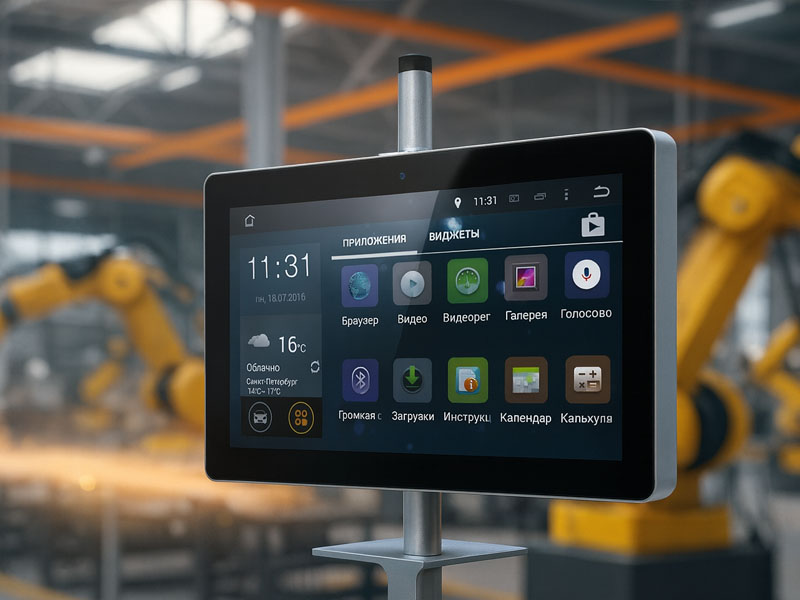
smart control panel
6. Customizable and Scalable Solutions
One of the key advantages of customized control panels in smart factory integration is their ability to be tailored to the specific needs of the factory. Different manufacturing environments have different requirements, and Portworld offers solutions that can be fully customized in terms of both hardware and software.
For example, Portworld’s YC-1011 smart control panel can be configured with different screen sizes, input methods, and communication protocols (such as Ethernet, Wi-Fi, and Bluetooth) to suit the factory’s operational needs. Whether it’s a small production line or a large-scale manufacturing facility, customized control panels provide the flexibility to scale operations and add new systems as the factory grows.
Moreover, these panels can integrate with existing factory management systems (such as MES, ERP, and SCADA), providing a seamless connection between factory equipment, production scheduling, and inventory management.
7. Portworld’s Role in Smart Factory Integration
As a leading provider of customizable control panels, Portworld offers a comprehensive range of products and services designed to support the integration of smart factory systems. Key offerings include:
- Custom Smart Control Panels: Portworld’s panels, such as the YC-1011, YC-P5, and YC-SM41P-KNX, provide robust solutions for factory automation, equipment monitoring, energy management, and more.
- OEM/ODM Services: Portworld offers customized software and hardware solutions, enabling manufacturers to create control panels tailored to their specific factory needs.
- Integration and Support: With years of expertise in system integration, Portworld provides expert technical support to help factories seamlessly incorporate control panels into their existing infrastructure.
Customized control panels are essential components in the successful integration of smart factory systems. By providing a centralized interface for monitoring and controlling diverse systems, these panels enhance efficiency, streamline automation, improve safety, and help optimize energy use. Portworld plays a crucial role in enabling smart factory integration with its customizable control panel solutions, helping manufacturers meet the challenges of modern production and paving the way for more intelligent, automated, and sustainable manufacturing environments.

